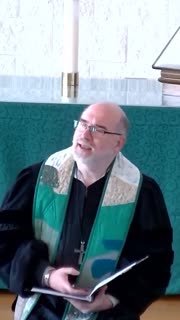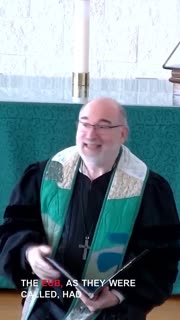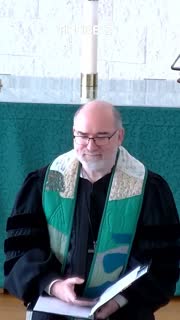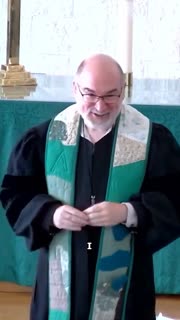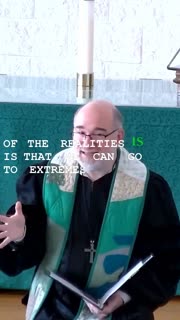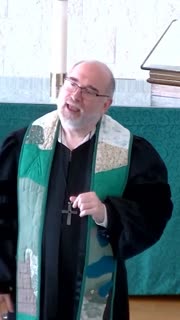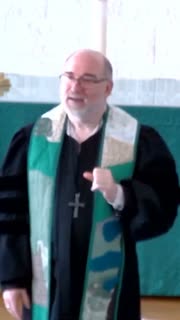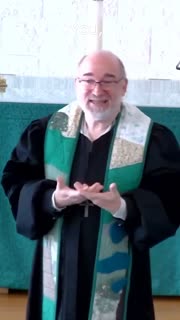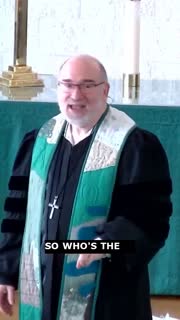Evangelism: A Journey of Respect and Transformation
Devotional
Sermon Summary
Bible Study Guide
Sermon Clips
### Quotes for Outreach
1. "One of the things that is really interesting about the United Church is that we were formed in 1925 by the coming together of a number of communities of faith, a number of denominations. You know, about 70% of the Presbyterians in Canada and the Methodist Church in Canada. Let's see. The Congregationalist Union, a whole bunch of little churches that had decided we were taking just too long to get this union happening, so they decided that they would start up by the rules." [20:07] (37 seconds)
2. "The EUB, as they were called, had at its core, one of the things that they really believed was vitally important was teaching the gospel. So while they had worship service and preaching and things like that, it was the teaching part, and the teaching in the world, the evangelical practice that was really important. For that denomination, the idea of sharing the gospel of Jesus, which is all that evangelism means, was central." [21:15] (39 seconds)
3. "There's a reason I'm bringing up evangelism today. You see, it's actually part of our responsibility as disciples of Jesus to share those moments with others where Jesus has touched our lives and even more importantly to share those places where Jesus can be transformative in someone else's life or in the world." [28:12] (36 seconds)
4. "For a long time in the United Church, I really do believe that we move to a place of what we're doing right now, with our faith, we called active evangelism. That was an evangelism that we kind of showed the world by what we were doing, right? By how we lived our lives. People would know that Jesus was a good thing because people would look at us as Christian people and that we were living really, you know, ethical, moral, loving lives, and they would want to participate in that." [43:07] (31 seconds)
5. "Unless we connect the Jesus story with how we love, then people won't know who we are by our love. We actually have to use words as well as actions. Now, how many people just heard me say that and their heart kind of went, bleh? The idea that you might actually be invited to share words about Jesus. Does that scare anybody in this room?" [44:48] (36 seconds)
### Quotes for Members
1. "One of the realities is that we can go to extremes in a whole bunch of different ways. Some of our evangelical sibs have gone to extremes in how they worship, how they interpret the scripture. We see some of the colonialism coming back in Christian nationalism that seems to be showing up in many of the fundamentalist parts or the very evangelical parts of the Christian tradition." [26:35] (31 seconds)
2. "How has your journey with Jesus, your relationship with God, your dance with the Holy Spirit, however you put it, how has that made a difference in your life? How has it transformed parts of who you are, or maybe all of who you are? Each of us has different ways of living that. Has that relationship with the divine in Jesus, dancing with the Holy Spirit, being with God the Creator, it changed you in a way that's made you better?" [49:16] (41 seconds)
3. "If someone sat down with you and said, so why are you Christian? How would you answer? What would be your elevator speech about being Christian? Be. What would it be about being part of grace? What would your tweet, your 140 characters, be about being in a relationship with the divine?" [50:33] (38 seconds)
4. "So I got to tell you, if it weren't for my community of faith, if it weren't for my faith, I could have been a much nastier human being. And it's hard for me to say that. But honestly, without you, in a wide sense, I could be a much worse person, a much more hateful person, without God, without Jesus, not holding me to account, but loving me into wholeness. I could be a much more hurtful, harmful person." [51:43] (36 seconds)
5. "So who's the person in your life that you can pair up with around this? That when you're worried about it, or when you can't figure out how it is you're supposed to do these kinds of things, who's the person that you can chat with? Jesus talked about, oh, don't take an extra shirt, but do wear your sandals. Take a staff, but don't take an extra cloak. Don't worry about money. Go and sit in somebody's house, and if they want to listen to you, they'll give you supper." [54:39] (32 seconds)
Ask a question about this sermon
1. "One of the things that is really interesting about the United Church is that we were formed in 1925 by the coming together of a number of communities of faith, a number of denominations. You know, about 70% of the Presbyterians in Canada and the Methodist Church in Canada. Let's see. The Congregationalist Union, a whole bunch of little churches that had decided we were taking just too long to get this union happening, so they decided that they would start up by the rules." [20:07] (37 seconds)
2. "The EUB, as they were called, had at its core, one of the things that they really believed was vitally important was teaching the gospel. So while they had worship service and preaching and things like that, it was the teaching part, and the teaching in the world, the evangelical practice that was really important. For that denomination, the idea of sharing the gospel of Jesus, which is all that evangelism means, was central." [21:15] (39 seconds)
3. "There's a reason I'm bringing up evangelism today. You see, it's actually part of our responsibility as disciples of Jesus to share those moments with others where Jesus has touched our lives and even more importantly to share those places where Jesus can be transformative in someone else's life or in the world." [28:12] (36 seconds)
4. "For a long time in the United Church, I really do believe that we move to a place of what we're doing right now, with our faith, we called active evangelism. That was an evangelism that we kind of showed the world by what we were doing, right? By how we lived our lives. People would know that Jesus was a good thing because people would look at us as Christian people and that we were living really, you know, ethical, moral, loving lives, and they would want to participate in that." [43:07] (31 seconds)
5. "Unless we connect the Jesus story with how we love, then people won't know who we are by our love. We actually have to use words as well as actions. Now, how many people just heard me say that and their heart kind of went, bleh? The idea that you might actually be invited to share words about Jesus. Does that scare anybody in this room?" [44:48] (36 seconds)
### Quotes for Members
1. "One of the realities is that we can go to extremes in a whole bunch of different ways. Some of our evangelical sibs have gone to extremes in how they worship, how they interpret the scripture. We see some of the colonialism coming back in Christian nationalism that seems to be showing up in many of the fundamentalist parts or the very evangelical parts of the Christian tradition." [26:35] (31 seconds)
2. "How has your journey with Jesus, your relationship with God, your dance with the Holy Spirit, however you put it, how has that made a difference in your life? How has it transformed parts of who you are, or maybe all of who you are? Each of us has different ways of living that. Has that relationship with the divine in Jesus, dancing with the Holy Spirit, being with God the Creator, it changed you in a way that's made you better?" [49:16] (41 seconds)
3. "If someone sat down with you and said, so why are you Christian? How would you answer? What would be your elevator speech about being Christian? Be. What would it be about being part of grace? What would your tweet, your 140 characters, be about being in a relationship with the divine?" [50:33] (38 seconds)
4. "So I got to tell you, if it weren't for my community of faith, if it weren't for my faith, I could have been a much nastier human being. And it's hard for me to say that. But honestly, without you, in a wide sense, I could be a much worse person, a much more hateful person, without God, without Jesus, not holding me to account, but loving me into wholeness. I could be a much more hurtful, harmful person." [51:43] (36 seconds)
5. "So who's the person in your life that you can pair up with around this? That when you're worried about it, or when you can't figure out how it is you're supposed to do these kinds of things, who's the person that you can chat with? Jesus talked about, oh, don't take an extra shirt, but do wear your sandals. Take a staff, but don't take an extra cloak. Don't worry about money. Go and sit in somebody's house, and if they want to listen to you, they'll give you supper." [54:39] (32 seconds)
